Franz Kafka bibliography
Franz Kafka, a German-language writer of novels and short stories, regarded by critics as one of the most influential authors of the 20th century, was trained as a lawyer and was employed by an insurance company, writing only in his spare time.
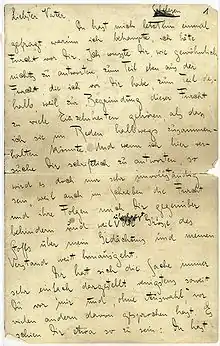
Fiction
Novels
| English title | Original German title | English translations | Notes | Cover first edition |
|---|---|---|---|---|
| The Trial | Der Prozess (1925) | Willa and Edwin Muir (1935); Idris Parry (1994); Breon Mitchell (1999); David Wyllie (2003); Richard Stokes (2005); John Williams; (2008) Mike Mitchell (2009) | Includes the parable "Before the Law" | 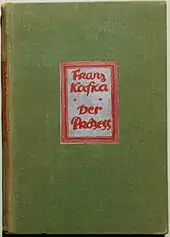 |
| The Castle | Das Schloss (1926) | Willa and Edwin Muir (1930); Mark Harman (1998); J. A. Underwood (2000); Anthea Bell (2009) | published in two versions – Max Brod's 1926 edition and a "definitive edition" in 1951 | 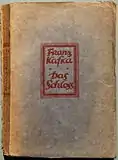 |
| Amerika or The Man Who Disappeared; Amerika: The Missing Person | Amerika or Der Verschollene (1927) | Willa and Edwin Muir (1938); Michael Hofmann (2004); Mark Harman (2008) | Includes the short story "The Stoker" as first chapter | 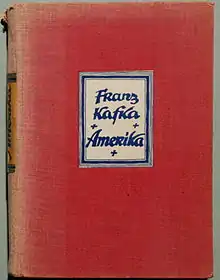 |
Short stories
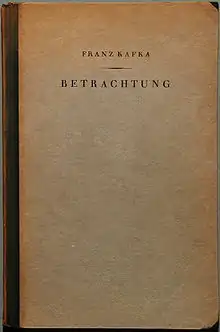
| English title | German title |
|---|---|
| "Children on a Country Road" | "Kinder auf der Landstraße" |
| "The Trees" | "Die Bäume" |
| "Clothes" | "Kleider" |
| "Excursion into the Mountains" | "Der Ausflug ins Gebirge" |
| "Rejection" | "Die Abweisung" |
| "The Street Window" | "Das Gassenfenster" |
| "The Tradesman" | "Der Kaufmann" |
| "Absent-minded Window-gazing" | "Zerstreutes Hinausschaun" |
| "The Way Home" | "Der Nachhauseweg" |
| "Passers-by" | "Die Vorüberlaufenden" |
| "On the Tram" | "Der Fahrgast" |
| "Reflections for Gentlemen-Jockeys" | "Zum Nachdenken für Herrenreiter" |
| "The Wish to be a Red Indian" | "Wunsch, Indianer zu werden" |
| "Unhappiness" | "Unglücklichsein" |
| "Bachelor's Ill Luck" | "Das Unglück des Junggesellen" |
| "Unmasking a Confidence Trickster" | "Entlarvung eines Bauernfängers" |
| "The Sudden Walk" | "Der plötzliche Spaziergang" |
| "Resolutions" | "Entschlüsse" |
| English title | German title |
|---|---|
| "The New Advocate" | "Der neue Advokat" |
| "A Country Doctor" | "Ein Landarzt" (1919) |
| "Up in the Gallery" | "Auf der Galerie" |
| "An Old Manuscript" | "Ein altes Blatt" |
| "Before the Law" | "Vor dem Gesetz" (part of "The Trial") |
| "Jackals and Arabs" | "Schakale und Araber" |
| "A Visit to a Mine" | "Ein Besuch im Bergwerk" |
| "The Next Village" | "Das nächste Dorf" |
| "A Message from the Emperor" | "Eine kaiserliche Botschaft" (part of "The Great Wall of China") |
| "The Cares of a Family Man" | "Die Sorge des Hausvaters" |
| "Eleven Sons" | "Elf Söhne" |
| "A Fratricide" | "Der Mord / Ein Brudermord" |
| "A Dream" | "Ein Traum" |
| "A Report to an Academy" | "Ein Bericht für eine Akademie" |
| English title | Original German title | Collected in: | |
|---|---|---|---|
| "Shamefaced Lanky and Impure in Heart" | "Der Unredliche in seinem Herzen" (1958, written 1902) | Letters to Friends, Family, and Editors | |
| "Description of a Struggle" includes two dialogues originally published separately: "Conversation with the Supplicant" "Conversation with the Drunk" | "Beschreibung eines Kampfes" (1909) "Gespräch mit dem Beter" "Gespräch mit dem Betrunkenen" | Description of a Struggle, The Complete Stories; Both dialogues originally published in Hyperion (Munich, 1909); a different version of "Conversation with the Supplicant" appears in The Penal Colony: Stories and Short Pieces | |
| "Wedding Preparations in the Country" | "Hochzeitsvorbereitungen auf dem Lande" (1954, written 1907-1908) | The Complete Stories, Dearest Father. Stories and Other Writings | |
| "The Judgment" | "Das Urteil" (1913) | The Complete Stories, The Sons, The Penal Colony: Stories and Short Pieces | |
| The Metamorphosis | Die Verwandlung (1915) | The Complete Stories, The Sons, The Penal Colony: Stories and Short Pieces | |
| "The Stoker" | "Der Heizer" (1913) | The Sons; first chapter of Amerika | |
| "In the Penal Colony" | "In der Strafkolonie" (1919) | The Complete Stories, The Penal Colony: Stories and Short Pieces | |
| "The Village Schoolmaster (The Giant Mole)" | "Der Dorfschullehrer" or Der Riesenmaulwurf (1931, written 1915) | The Complete Stories, The Great Wall of China | |
| "Blumfeld, an Elderly Bachelor" | "Blumfeld, ein älterer Junggeselle" (1936, written 1913) | Description of a Struggle, The Complete Stories | |
| The Warden of the Tomb (short play) | Der Gruftwächter (written 1916-17) | Description of a Struggle, The Complete Stories | |
| "The Hunter Gracchus" | "Der Jäger Gracchus" (1931, written 1917) | The Complete Stories, Parables and Paradoxes, The Great Wall of China | |
| "The Great Wall of China" | "Beim Bau der Chinesischen Mauer" (1931, written 1917) | The Complete Stories, The Great Wall of China | |
| "The Refusal" | "Die Abweisung" (written 1920) | Description of a Struggle, The Complete Stories, Parables and Paradoxes | |
| "A Hunger Artist" | "Ein Hungerkünstler" (1922) | The Complete Stories, The Penal Colony: Stories and Short Pieces | 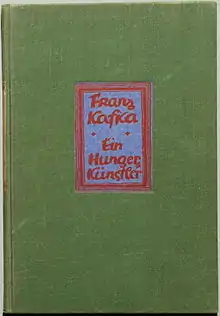 |
| "Investigations of a Dog" | "Forschungen eines Hundes" (written 1922) | The Complete Stories, The Great Wall of China | |
| "A Little Woman" | "Eine kleine Frau" (1924) | The Complete Stories, The Penal Colony: Stories and Short Pieces | |
| "The Burrow" | "Der Bau" (1931) | The Complete Stories, The Great Wall of China | |
| "Josephine the Singer, or The Mouse Folk" | "Josefine, die Sängerin oder Das Volk der Mäuse" (1924) | The Complete Stories, The Penal Colony: Stories and Short Pieces | |
| "The Bridge" | "Die Brücke" | The Complete Stories, The Great Wall of China | |
| "The Bucket Rider" | "Der Kübelreiter" (1921, written 1917) | The Complete Stories, The Penal Colony: Stories and Short Pieces, The Great Wall of China | |
| "The Knock at the Manor Gate" | "Der Schlag ans Hoftor" | The Complete Stories, The Great Wall of China | |
| "My Neighbor" | "Der Nachbar" (written 1917) | The Complete Stories, The Great Wall of China | |
| "A Crossbreed" | "Eine Kreuzung" | The Complete Stories, The Great Wall of China | |
| "A Common Confusion" | "Eine alltägliche Verwirrung" | The Complete Stories, The Great Wall of China | |
| "The Truth about Sancho Panza" | "Die Wahrheit über Sancho Pansa" | The Complete Stories, Parables and Paradoxes, The Great Wall of China | |
| "The Silence of the Sirens" | "Das Schweigen der Sirenen" | The Complete Stories, Parables and Paradoxes, The Great Wall of China | |
| "Prometheus" | "Prometheus" (written 1917-23) | The Complete Stories, Parables and Paradoxes, The Great Wall of China | |
| "The City Coat of Arms" | "Das Stadtwappen" | The Complete Stories, Parables and Paradoxes, The Great Wall of China | |
| "Poseidon" | "Poseidon" (written 1920) | Description of a Struggle, The Complete Stories, Parables and Paradoxes | |
| "Fellowship" | "Gemeinschaft" | Description of a Struggle, The Complete Stories | |
| "At Night" | "Nachts" | Description of a Struggle, The Complete Stories | |
| "The Problem of Our Laws" | "Zur Frage der Gesetze" | The Complete Stories, Parables and Paradoxes, The Great Wall of China | |
| "The Conscription of Troops" | "Die Truppenaushebung" | Description of a Struggle, The Complete Stories | |
| "The Test" | "Die Prüfung" | Description of a Struggle, The Complete Stories, Parables and Paradoxes | |
| "The Vulture" | "Der Geier" | Description of a Struggle, The Complete Stories, Parables and Paradoxes | |
| "The Helmsman" | "Der Steuermann" | Description of a Struggle, The Complete Stories | |
| "The Top" | "Der Kreisel" | Description of a Struggle, The Complete Stories | |
| A Little Fable | "Kleine Fabel" | The Complete Stories, The Great Wall of China | |
| Home-Coming | "Heimkehr" | Description of a Struggle, The Complete Stories | |
| First Sorrow | "Erstes Leid" (written 1921-22) | The Complete Stories, The Penal Colony: Stories and Short Pieces | |
| "The Departure" | "Der Aufbruch" (written 1920-21) | Description of a Struggle, The Complete Stories | |
| "Advocates" | "Fürsprecher" (written 1922) | Description of a Struggle, The Complete Stories | |
| "The Married Couple" | "Das Ehepaar" (written 1922) | The Complete Stories, The Great Wall of China | |
| "Give It Up!" | "Gibs auf!" | Description of a Struggle, The Complete Stories | |
| "On Parables" | "Von den Gleichnissen" | The Complete Stories, Parables and Paradoxes, The Great Wall of China | |
| "Peking and the Emperor" | "Der Kaiser von Peking" | Parables and Paradoxes | |
| "The Great Wall and the Tower of Babel" | "Die Chinesische Mauer und der Turmbau von Babel" | Parables and Paradoxes | |
| "Paradise" | "Das Paradies" | Parables and Paradoxes | |
| "The Tower of Babel" | "Der Turm zu Babel" | Parables and Paradoxes | |
| "The Pit of Babel" | "Der Schacht von Babel" | Parables and Paradoxes | |
| "Abraham" | "Abraham" | Parables and Paradoxes | |
| "Mount Sinai" | "Der Berg Sinai" | Parables and Paradoxes | |
| "The Building of the Temple" | "Der Tempelbau" | Parables and Paradoxes | |
| "The Animal in the Synagogue" | "Das Tier in der Synagoge" | Parables and Paradoxes | |
| "The Watchman" | "Der Wächter" | Parables and Paradoxes | |
| "The Coming of the Messiah" | "Das Kommen des Messias" | Parables and Paradoxes | |
| "The Sirens" | "Die Sirenen" | Parables and Paradoxes | |
| "Leopards in the Temple" | "Leoparden in Tempel" | Parables and Paradoxes | |
| "Alexander the Great" | "Alexander der Grosse" | Parables and Paradoxes | |
| "Diogenes" | "Diogenes" | Parables and Paradoxes | |
| "The Building of a City" | "Der Bau einer Stadt" | Parables and Paradoxes | |
| "The Imperial Colonel" | "Der Kaiserliche Oberst" | Parables and Paradoxes | |
| "The Emperor" | "Der Kaiser" | Parables and Paradoxes | |
| "In the Caravansary" | "In der Karawanserei" | Parables and Paradoxes | |
| "The Cell" | "Die Zelle" | Parables and Paradoxes | |
| "The Invention of the Devil" | "Die Erfindung des Teufels" | Parables and Paradoxes | |
| "The Savages" | "Die Wilden" | Parables and Paradoxes | |
| "The Green Dragon" | "Der Grüne Drache" | Parables and Paradoxes | |
| "The Tiger" | "Der Tiger" | Parables and Paradoxes | |
| "Couriers" | "Kuriere" | Parables and Paradoxes | |
| "A Chinese Puzzle" | "Ein Geduldspiel" | Parables and Paradoxes | |
| "Robinson Crusoe" | "Robinson Crusoe" | Parables and Paradoxes | |
| "The Spring" | "Die Quelle" | Parables and Paradoxes | |
| "The Hunger Strike" | "Die Unersättlichsten" | Parables and Paradoxes | |
| "My Destination" | "Das Ziel" | Parables and Paradoxes |
Non-fiction
Diaries and notebooks
| Title | Original German title | Translators | Notes |
|---|---|---|---|
| Diaries 1910–1923 | Tagebücher 1910–1923 | 1910–1913 Joseph Kresh 1914–1923 Martin Greenberg | Originally published in two volumes |
| The Blue Octavo Notebooks | Ernst Kaiser and Eithne Wilkins | included in Dearest Father. Stories and Other Writings |
Letters
Kafka wrote hundreds of letters to family and close female friends, including his father, his fiancée Felice Bauer, and his youngest sister Ottla.
| Title | Original German title | Translators | Notes |
|---|---|---|---|
| Letter to His Father | Brief an den Vater | Ernst Kaiser and Eithne Wilkins | Included in The Sons and Dearest Father. Stories and Other Writings |
| Letters to Felice | Briefe an Felice und andere Korrespondenz aus der Verlobungszeit | James Stern and Elisabeth Duckworth | Includes Kafka's letters to Grete Bloch |
| Letters to Milena | Briefe an Milena | Philip Boehm | Includes Milena's letters to Max Brod, four essays by her and an obituary for Kafka |
| Letters to Ottla | Briefe an Ottla und die Familie | Richard and Clara Winston | Includes letters to Kafka's parents, sister Ottla, postcards, and drawings |
| Letters to Friends, Family, and Editors | Briefe 1902–1924 | Richard and Clara Winston | Includes a selection from the slips of paper Kafka used to communicate in the last few weeks of his life when he was advised not to speak |
Essays
| Title | Original German title | Notes | Included in: |
|---|---|---|---|
| The Aeroplanes At Brescia | Die Aeroplane in Brescia | Report on the air show at Brescia | The Penal Colony: Stories and Short Pieces |
| The First Long Train Journey | Die erste lange Eisenbahnfahrt | Written by Kafka and Max Brod | The Penal Colony: Stories and Short Pieces |
| Review of Hyperion | Eine entschlafene Zeitschrift | Review of the literary magazine | The Penal Colony: Stories and Short Pieces |
| Review of A Novel about Youth | Ein Roman der Jugend | Review of Felix Sternheim's Die Geschichte des jungen Oswald | The Penal Colony: Stories and Short Pieces |
| On Kleist's "Anecdotes" | Über Kleist's Anekdoten | Review of a collection of Heinrich Kleist's anecdotes | The Penal Colony: Stories and Short Pieces |
Work-related writings
| Title | Year | Included in: |
|---|---|---|
| The Scope of Compulsory Insurance for the Building trades | 1908 | Franz Kafka: The Office Writings |
| Speech on the Occasion of the Inauguration of the Institute's New Director | 1909 | Franz Kafka: The Office Writings |
| Fixed-Rate Insurance Premiums for Small Farms Using Machinery | 1909 | Franz Kafka: The Office Writings |
| Inclusion of Private Automobile "Firms" in the Compulsory Insurance Program | 1909 | Franz Kafka: The Office Writings |
| Appeal against Risk Classification of Christian Geipel & Sohn, Mechanical Weaving Mill in Asch | 1910 | Franz Kafka: The Office Writings |
| Measures for Preventing Accidents from Wood-Planing Machines | 1910 | Franz Kafka: The Office Writings |
| On the Examination of Firms by Trade Inspectors | 1911 | Franz Kafka: The Office Writings |
| Workmen's Insurance and Employers: Two Articles in the Tetschen Bodenbacher Zeitung | 1911 | Franz Kafka: The Office Writings |
| Petition of the Toy Producers' Association in Katharinaberg, Erzgebirge | 1912 | Franz Kafka: The Office Writings |
| Risk Classification Appeal by Norbert Hochsieder, Boarding House Owner in Marienbad | 1912 | Franz Kafka: The Office Writings |
| Letters to the Workmen's Accident Insurance Institute in Prague | 1912–15 | Franz Kafka: The Office Writings |
| Criminal Charge against Josef Renelt for the Illegal Withholding of Insurance Fees | 1913 | Franz Kafka: The Office Writings |
| Second International Congress on Accident Prevention and First Aid in Vienna | 1913 | Franz Kafka: The Office Writings |
| Accident Prevention in Quarries | 1914 | Franz Kafka: The Office Writings |
| Jubilee Report: Twenty-Five Years of the Workmen's Accident Insurance Institute | 1914 | Franz Kafka: The Office Writings |
| Risk Classification and Accident Prevention in Wartime | 1915 | Franz Kafka: The Office Writings |
| A Public Psychiatric Hospital for German-Bohemia | 1916 | Franz Kafka: The Office Writings |
| "Help Disabled Veterans! An Urgent Appeal to the Public" | 1916/1917 | Franz Kafka: The Office Writings |
Editions and collections
Works and first publications in German
Only a few of Kafka's works were published during his lifetime: the story collections Betrachtung (Contemplation) and Ein Landarzt (A Country Doctor), and individual stories (such as "Die Verwandlung" ("The Metamorphosis")) in literary magazines. He prepared the story collection Ein Hungerkünstler (A Hunger Artist) for print, but it was not published until after his death. Kafka's unfinished works, including his novels Der Process, Das Schloss and Amerika (also known as Der Verschollene, The Man Who Disappeared), were published posthumously, mostly by his friend Max Brod, who ignored Kafka's wish to have the manuscripts destroyed. Brod also published letters, diaries and aphorisms.
Many of Kafka's works have uncertain dates of writing and/or were written over long periods of time. In such cases the year the writing of the work began is used. Year and place of the first publication is shown. For many works the German text is available, for several works also an English translation. It is linked in columns "de" (short for "deutsch", German) and "en" (short for English).
| Standard English title | German title | Literal English title | de | en | Genre | Date of writing | Date of first publication | Place of publication | Cover | Remarks |
|---|---|---|---|---|---|---|---|---|---|---|
| Amerika or The Man Who Disappeared | Amerika or Der Verschollene |
America | de | novel | 1912 | 1927 | Leipzig |  |
title Amerika by Brod, contains "Der Heizer" ("The Stoker") | |
| The Trial | Der Process | de | novel | 1914 | 1925 | Berlin |  |
also spelled in German as Der Prozess and Der Prozeß | ||
| The Castle | Das Schloss | The Castle | de | novel | 1922 | 1926 | Leipzig |  |
also spelled in German as Das Schloß | |
| Contemplation also known as Meditation |
Betrachtung | de | story collection | 1904–1912 | 1912 | Leipzig |  |
some stories from 1908 in Hyperion | ||
| A Country Doctor | Ein Landarzt | de | story collection | 1919 | 1919 | Leipzig | 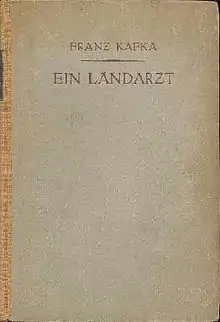 |
|||
| A Hunger Artist | Ein Hungerkünstler | de | story collection | 1922 | 1924 | Prague |  |
|||
| The Great Wall of China | Beim Bau der chinesischen Mauer | de | story collection | 1918 | 1931 | Berlin | ||||
| The Warden of the Tomb | Der Gruftwächter | play | 1916–1917 | 1958 | New York | in Description of a Struggle | ||||
| "Description of a Struggle" including "Conversation with the Supplicant", "Conversation with the Drunk" |
"Beschreibung eines Kampfes" including "Gespräch mit dem Beter",
"Gespräch mit dem Betrunkenen" |
Urteil, Beter, Betrunkener | story | 1904 | 1909 | Munich | dialogues first in Hyperion | |||
| "Wedding Preparations in the Country" | "Hochzeitsvorbereitungen auf dem Lande" | de | story | 1907–1908 | 1954 | London | an incomplete work intended to be a novel | |||
| "The Aeroplanes At Brescia" | "Die Aeroplane in Brescia" | de | story | 1909 | 1909 September | Prague | first in Bohemia | |||
| The First Long Journey by Rail (Prague-Zurich) | story | 1912 | 1912 May | in Herderblätter | first chapter of unfinished novel Richard und Samuel: Eine kleine Reise durch mitteleuropäische Gegenden | |||||
| "The Judgment" | "Das Urteil" | The Verdict | de | story | 1912 22–23 September | 1913 | Leipzig | in the literary yearbook Arkadia | ||
| "The Metamorphosis" | "Die Verwandlung" | The Transformation | de | en | story | 1912 | 1915 | Leipzig | in Die Weißen Blätter | |
| "The Stoker" | "Der Heizer" | de | story | 1913 | 1927 | Leipzig | in Amerika | |||
| "Before the Law" | "Vor dem Gesetz" | de | en | story | 1914 | 1915 | Prague | in the independent Jewish weekly Selbstwehr, in Ein Landarzt, in Der Process | ||
| "In the Penal Colony" | "In der Strafkolonie" | de | en | story | 1914 | 1919 | Leipzig | |||
| "The Village Schoolmaster" ("The Giant Mole") |
"Der Dorfschullehrer" or "Der Riesenmaulwurf" | de | story | 1914–1915 | 1931 | Berlin | in Beim Bau der Chinesischen Mauer | |||
| "Blumfeld, an Elderly Bachelor" | "Blumfeld, ein älterer Junggeselle" | de | story | 1915 | 1958 | New York | in Description of a Struggle | |||
| "The Hunter Gracchus" | "Der Jäger Gracchus" | de | story | 1917 | 1931 | Berlin | in Beim Bau der Chinesischen Mauer | |||
| "A Common Confusion" | "Eine alltägliche Verwirrung" | de | story | 1917 | 1931 | Berlin | in Beim Bau der Chinesischen Mauer | |||
| "The Bridge" | "Die Brücke" | de | story | 1917 | 1931 | Berlin | in Beim Bau der Chinesischen Mauer | |||
| "A Report to an Academy" | "Ein Bericht für eine Akademie" | de | en | story | 1917 | 1917 | Prague | in Der Jude | ||
| "Jackals and Arabs" | "Schakale und Araber" | de | en | story | 1917 | 1917 | Prague | in Der Jude | ||
| "A Crossbreed" | "Eine Kreuzung" | de | story | 1917 | 1931 | Berlin | in Beim Bau der Chinesischen Mauer | |||
| "The Knock at the Manor Gate" | "Der Schlag ans Hoftor" | de | story | 1917 | 1931 | Berlin | in Beim Bau der Chinesischen Mauer | |||
| "The Silence of the Sirens" | "Das Schweigen der Sirenen" | de | story | 1917 | 1931 | Berlin | in Beim Bau der Chinesischen Mauer | |||
| "The Truth about Sancho Panza" | "Die Wahrheit über Sancho Pansa" | de | story | 1917 | 1931 | Berlin | in Beim Bau der Chinesischen Mauer | |||
| "The Great Wall of China" | "Beim Bau der chinesischen Mauer" | At the building of the Chinese Wall | de | en | story | 1918 | 1931 | Berlin | in Beim Bau der Chinesischen Mauer | |
| "Prometheus" | "Prometheus" | de | story | 1918 | 1931 | Berlin | in Beim Bau der Chinesischen Mauer | |||
| "A Country Doctor" | "Ein Landarzt" | de | en | story | 1919 | 1919 | Leipzig | in Ein Landarzt | ||
| "An Old Manuscript" | "Ein altes Blatt" | "An old page" or "An old leaf" | de | story | 1919 | 1920 | Leipzig | in Ein Landarzt | ||
| "The City Coat of Arms" | "Das Stadtwappen" | de | story | 1920 | 1931 | Berlin | in Beim Bau der Chinesischen Mauer | |||
| "The Problem of Our Laws" | "Zur Frage der Gesetze" | de | story | 1920 | 1931 | Berlin | in Beim Bau der Chinesischen Mauer | |||
| "On Parables" | "Von den Gleichnissen" | de | story | 1931 | Berlin | in Beim Bau der Chinesischen Mauer | ||||
| "A Little Fable" | "Kleine Fabel" | de | story | 1920 | 1931 | Berlin | in Beim Bau der Chinesischen Mauer | |||
| "Poseidon" | "Poseidon" | de | story | 1920 | 1936 | in collection Beschreibung eines Kampfes | ||||
| "The Refusal" | "Die Abweisung" | The Rejection | story | 1920 | 1970 | Frankfurt | title by Brod, same as a different earlier story by Kafka | |||
| "The Bucket Rider" | "Der Kübelreiter" | de (1921), de (1931) | story | 1921 | 1921 | Prag | in Prager Presse | |||
| "A Hunger Artist" ("A Fasting Artist", "A Starvation Artist") |
"Ein Hungerkünstler" | de | en | story | 1922 | 1922 | Prague | in Die neue Rundschau, then in Ein Hungerkünstler | ||
| "First Sorrow" | "Erstes Leid" | de | story | 1921–1922 | 1922 | Leipzig | in periodical Genius | |||
| "Investigations of a Dog" | "Forschungen eines Hundes" | de | story | 1923 | 1931 | Berlin | in Beim Bau der Chinesischen Mauer | |||
| "A Little Woman" | "Eine kleine Frau" | de | story | 1923–1924 | 1924 | Prague | in Prager Tagblatt, then in Ein Hungerkünstler | |||
| "The Burrow" | "Der Bau" | de | story | 1923–1924 | 1924 | in Ein Hungerkünstler | ||||
| "Josephine the Singer, or the Mouse Folk" | "Josefine, die Sängerin, oder Das Volk der Mäuse" | de | story | 1923 | 1924 | Prague | in Prager Presse, then in Ein Hungerkünstler | |||
| Franz Kafka's Diaries | Tagebücher | diary | 1910–1923 | 1948 | New York | |||||
| The Blue Octavo Notebooks | Oxforder Oktavhefte | Oxford Octavo Notebooks | notebook | 1917–1919 | 1954 | New York | also known as The Eight Octavo Notebooks | |||
| Letter to His Father | Brief an den Vater | de | letter | 1919 November | 1966 | New York | ||||
| Letters to Felice | Briefe an Felice | letter collection | 1912–1917 | 1967 | Frankfurt am Main | |||||
| Letters to Ottla | Briefe an Ottla und die Familie | Letters to Ottla and to the family | letter collection | 1909–1924 | 1974 | Frankfurt am Main | includes some letters to his parents and other family members | |||
| Letters to Milena | Briefe an Milena | letter collection | 1920–23 | 1952 | Frankfurt am Main | |||||
| Letters to Family, Friends, and Editors | Briefe 1902–1924 | letter collection | 1900–24 | 1959 | New York | most of the letters are to Brod | ||||
| Zürau Aphorisms, The | Die Zürauer Aphorismen or Betrachtungen über Sünde, Hoffnung, Leid und den wahren Weg | Reflections on Sin, Hope, Suffering, and the True Way | de | aphorisms | 1917–18 | 1931 | Cologne | Title by Brod | ||
English translations
Kafka often made extensive use of a characteristic particular to the German language allowing for long sentences that sometimes can span an entire page. Kafka's sentences then deliver an unexpected impact just before the full stop—that being the finalizing meaning and focus. This is achieved due to the construction of certain sentences in German which require that the verb be positioned at the end of the sentence. Such constructions are difficult to duplicate in other languages, so it is up to the resourceful translator to provide the reader with the same (or at least equivalent) effect found in the original text.[1] German's more flexible word order is not the only problem translating German into other languages. German also lacks an informal language register, uses modal connectives, and syntactic structures which can be translated in more than one way.[2] Kafka did not write in standard High German, but rather in a Praguean German heavily influenced by the Yiddish and Czech languages.[3] This has led philosophers Deleuze and Guattari to describe Kafka's linguistic style as "deterritorialized", characterized by a "withered vocabulary" and an "incorrect syntax".[3]
German sentences also have a different syntactic structure. Unlike English, German is a verb-final language, which places the main verb of a verb string (e.g., "transformed" in "had been transformed") at the end of a phrase. The difference can be seen in the contrast between the original German version of the first sentence in Kafka's "The Metamorphosis":
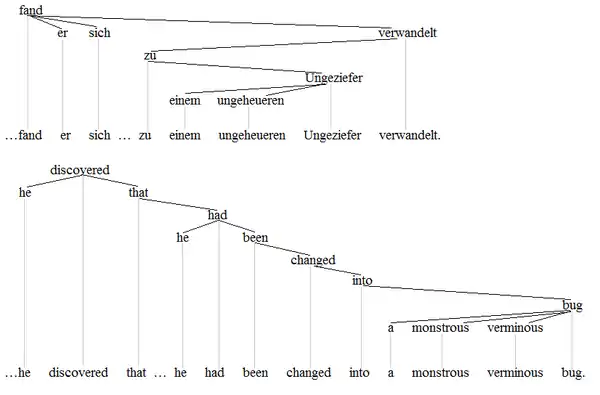
- Als Gregor Samsa eines Morgens aus unruhigen Traumen erwachte fand er sich in seinem Bett zu einem ungeheuren Ungeziefer verwandelt. (Original)
- As Gregor Samsa one morning from restless dreams awoke, found he himself in his bed into an enormous vermin transformed. (literal word for word translation)[4][5]
Another virtually insurmountable problem facing translators is how to deal with the author's intentional use of ambiguous idioms and words that have several meanings which result in writings difficult to precisely translate.[6][7] One such instance is found in the first sentence of "The Metamorphosis".[6] English translators have often sought to render the word Ungeziefer as "insect"; in today's German it means vermin. It is sometimes used colloquially to mean "bug" – a very general term, unlike the scientific sounding "insect". Kafka had no intention of labeling Gregor, the protagonist of the story, as any specific thing, but instead wanted to convey Gregor's disgust at his transformation. Translators have chosen numerous inexact and unsatisfactory ways to represent "[zu einem] ungeheuren Ungeziefer", unable to convey the repetition of the first two syllables and the equal four syllables of the two words in German:
- "gigantic insect" (Muir, 1948)
- "monstrous vermin" (Corngold, 1972, Neugroschel, 1993/1995, Freed, 1996)
- "giant bug" (Underwood, 1981)
- "monstrous insect" (Pasley, 1992)
- "enormous bug" (Appelbaum, 1996)
- "monstrous cockroach" (Hofmann, 2007)
Another example is Kafka's use of the German noun Verkehr in the final sentence of The Judgment. Literally, Verkehr means intercourse and, as in English, can have either a sexual or non-sexual meaning; in addition, it is used to mean transport or traffic. The sentence can be translated as: "At that moment an unending stream of traffic crossed over the bridge".[8] What gives added weight to the obvious double meaning of 'Verkehr' is Kafka's confession to Brod that when he wrote that final line, he was thinking of "a violent ejaculation".[9][10]
Selected publications in English
| Title | Genre | Translator | Publisher | Date of publication | Place of publication | Remarks |
|---|---|---|---|---|---|---|
| The Castle | novel | Willa and Edwin Muir | Secker & Warburg | 1930 | London | |
| The Great Wall of China | story collection | Willa and Edwin Muir | Martin Secker | 1933 | London | |
| The Trial | novel | Willa and Edwin Muir | Victor Gollancz | 1937 | London | |
| America | novel | Willa and Edwin Muir | Schocken Books | 1938 | United States | |
| The Diaries Of Franz Kafka | diaries | Joseph Kresh, Martin Greenberg and Hannah Arendt | Peregrine Books | 1963 | ||
| Amerika | novel | Mark Harman | Schocken Books | 2008 | United States | |
| The Penal Colony: Stories and Short Pieces | story collection | Willa and Edwin Muir | Schocken Books | 1948 | United States | |
| Dearest Father. Stories and Other Writings | letters | Ernst Kaiser and Eithne Wilkins | Schocken Books | 1954 | United States | |
| Description of a Struggle | story collection | Tania and James Stern | Schocken Books | 1958 | United States | |
| Parables and Paradoxes | story collection | Clement Greenberg, Ernst Kaiser & Eithne Wilkins, Willa & Edwin Muir, Tania & James Stern | Schocken Books | 1961 | United States | |
| The Complete Stories | story collection | Willa & Edwin Muir, Tania & James Stern | Schocken Books | 1971 | United States | |
| Letters to Family, Friends, and Editors | letters | Richard and Clara Winston | Schocken Books | 1977 | United States | |
| The Sons | story collection | Schocken Books | 1989 | United States | ||
| The Zürau Aphorisms | aphorisms | Michael Hofmann | Schocken Books | 2006 | United States | |
| Lost in America | novel | Anthony Northey | Vitalis Verlag | 2010 | Prague | |
| The Trial | novel | Susanne Lück, Maureen Fitzgibbons | Vitalis Verlag | 2012 | Prague | |
| The Castle | novel | Jon Calame, Seth Rogoff, Anthony Northey | Vitalis Verlag | 2014 | Prague | |
| Letter to Father | letters | Karen Reppin | Vitalis Verlag | 2016 | Prague | |
| The Metamorphosis | short story | Karen Reppin | Vitalis Verlag | 2016 | Prague | |
| A Country Doctor | story collection | Siegfried Mortkowitz | Vitalis Verlag | 2017 | Prague | |
| Meditation | story collection | Siegfried Mortkowitz | Vitalis Verlag | 2017 | Prague |
Schocken editions
| Title | Year | Translators | Notes |
|---|---|---|---|
| The Great Wall of China. Stories and Reflections | 1946 | Willa and Edwin Muir | |
| The Penal Colony: Stories and Short Pieces | 1948 | Willa and Edwin Muir | |
| Dearest Father. Stories and Other Writings | 1954 | Ernst Kaiser and Eithne Wilkins | |
| Description of a Struggle | 1958 | Tania and James Stern | |
| Parables and Paradoxes | 1961 | Clement Greenberg; Richard and Clara Winston; Ernst Kaiser and Eithne Wilkins; Willa and Edwin Muir; Tania and James Stern | Bilingual edition |
| The Complete Stories | 1971 | Willa and Edwin Muir; Tania and James Stern | Reprinted in 1995 with a foreword by John Updike |
| I Am a Memory Come Alive | 1974 | Martin Greenberg and Hannah Arendt; Joseph Kresh; Gerald Onn; Willa and Edwin Muir; Tania and James Stern; Ernst Kaiser and Eithne Wilkins | Autobiographical writings selected from diaries, letters, and aphorisms |
| The Sons | 1989 | Willa and Edwin Muir | Translations revised and updated by Arthur Wensinger |
| The Metamorphosis, In the Penal Colony, and Other Stories | 1995 | Willa and Edwin Muir | Includes all the stories published in Kafka's lifetime |
| The Zürau Aphorisms | 2006 | Michael Hofmann; Geoffrey Brock |
Other editions
| Title | Year | Publisher | Translators | Notes |
|---|---|---|---|---|
| The Basic Kafka | 1979 | Pocket Books | Willa and Edwin Muir Tania and James Stern Richard and Clara Winston | A selection from Kafka's short stories, diaries, and letters. |
| The Penguin Complete Novels of Franz Kafka | 1983 | Penguin Books | Willa and Edwin Muir | Includes The Trial, The Castle, and Amerika; republished by Vintage in 1999 |
| The Metamorphosis and Other Stories | 1993 | Scribner | Joachim Neugroschel | Collection of 30 short stories. Later editions include 39, then 41, stories under the title The Metamorphosis, In the Penal Colony, and Other Stories. |
| Metamorphosis and Other Stories | 2007 | Penguin Classics | Michael Hofmann | Short stories |
| Franz Kafka: The Office Writings | 2008 | Princeton University Press | Eric Patton; Ruth Hein | A selection of Kafka's professional writings |
| Kafka's Greatest Stories | 2010 | Vook | Enhanced with video providing historical background on Kafka's life and influences.) | |
| Essential Kafka: Rendezvous with Otherness | 2011 | Authorhouse | Enhanced with video providing historical background on Kafka's life and influences.) | |
| Investigations of a Dog & Other Creatures | 2017 | New Directions | Michael Hofmann | Short stories |
| The Lost Writings | 2020 | New Directions | Michael Hofmann |
Collaborations
| English title | Original German title | Written with: | Notes |
|---|---|---|---|
| Richard and Samuel | Richard und Samuel | Max Brod | Intended to be a novel; only the first chapter was completed.[11] |
References
- Kafka 1996, p. xi.
- Newmark 1991, pp. 63–64.
- Deleuze & Guattari 1986, pp. 22–25.
- Prinsky 2002.
- Poulakis 2005.
- Lawson 1960, pp. 216–219.
- Rhine 1989, pp. 447–458.
- Kafka 1996, p. 75.
- Brod 1960, p. 129.
- Hawes 2008, p. 50.
- The Kafka Project – Erstes Kapitel des Buches "Richard und Samuel" von Max Brod und Franz Kafka (in German)
Bibliography
- Brod, Max (1960). Franz Kafka: A Biography. New York: Schocken Books. ISBN 978-0-805-20047-8.CS1 maint: ref=harv (link)
- Deleuze, Gilles; Guattari, Félix (1986). Kafka: Toward a Minor Literature (Theory and History of Literature, Vol 30). Minneapolis, MN: University of Minnesota Press. ISBN 978-0-81661-515-5.CS1 maint: ref=harv (link)
- Hawes, James (2008). Why You Should Read Kafka Before You Waste Your Life. New York: St. Martin's Press. ISBN 978-0-31237-651-2.CS1 maint: ref=harv (link)
- Kafka, Franz (1996). The Metamorphosis and Other Stories. New York: Barnes & Noble. ISBN 978-1-56619-969-8.CS1 maint: ref=harv (link)
- Lawson, Richard H. (1960). "Ungeheueres Ungeziefer in Kafka's "Die Verwandlung"". The German Quarterly. 33 (3): 216–219. doi:10.2307/402242. JSTOR 402242.CS1 maint: ref=harv (link)
- Newmark, Peter (1991). About Translation. Wiltshire, England: Cromwell Press Ltd. ISBN 978-1-85359-117-4.CS1 maint: ref=harv (link)
- Poulakis, Victoria (November 11, 2005). "Translation: What Difference Does It Make. The Metamorphosis by Franz Kafka". Northern Virginia Community College. Retrieved September 2, 2012.
- Rhine, Marjorie E. (Winter 1989). "Untangling Kafka's Knotty Texts: The Translator's Prerogative?". Monatshefte. Madison, Wisconsin. 81 (4): 447–458. JSTOR 30166262.CS1 maint: ref=harv (link)
- Prinsky, Norman (2002). "Humn. 2002: World Humanities II. Notes and Questions on Franz Kafka's "The Metamorphosis" / "The Transformation"". Augusta State University. Archived from the original on October 11, 2012. Retrieved September 2, 2012.